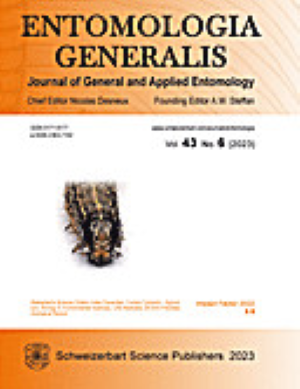全球食用昆虫生产现状和前景概览
IF 4.6
1区 农林科学
Q1 ENTOMOLOGY
引用次数: 0
摘要
人们对食用昆虫的兴趣与日俱增。世界范围内出现了不同程度的昆虫养殖,从小型家庭农场到高达 36 米、可容纳数百万只昆虫生长的垂直农场。昆虫的吸引力在于其生态效益,因为它们有助于未充分利用的有机残留物的价值化,同时只需最小的空间和水。昆虫品种的选择不仅受其生物学和行为学的影响,还受当地偏好和习俗的影响,并随着生产规模和地理位置的不同而变化。本综述文章旨在根据现有文献,对各大洲生产的主要昆虫物种、其目前的工业化水平以及生产前景提供最新概述。本文章由计算机程序翻译,如有差异,请以英文原文为准。
A worldwide overview of the status and prospects of edible insect production
There has been continuous and growing interest in edible insects. Worldwide, various levels of insect farming are emerging, ranging from small domestic farms to vertical farms reaching heights of 36 meters, accommodating several million growing insects. The appeal of insects lies in their ecological benefits, as they contribute to the valorization of underutilized organic residues while requiring minimal space and water. The selection of insect species is influenced not only by their biology and behavior but also by local preferences and customs, varying with the scale of production and geographical location. This review article aims to provide an updated overview of the main insect species produced across different continents, their current level of industrialization, and production prospects based on available literature.
求助全文
通过发布文献求助,成功后即可免费获取论文全文。
去求助
来源期刊

Entomologia Generalis
生物-昆虫学
CiteScore
7.10
自引率
18.80%
发文量
72
审稿时长
>12 weeks
期刊介绍:
Its scope covers all aspects of basic and applied research dealing with insects and more broadly with arthropods inhabiting wild, agricultural and/or urban habitats. The journal also considers research integrating various disciplines and issues within the broad field of entomology and ecology.
Entomologia Generalis publishes high quality research articles on advances in knowledge on the ecology and biology of arthropods, as well as on their importance for key ecosystems services, e.g. as biological control and pollination. The journal devotes special attention to contributions providing significant advances (i) on the fundamental knowledge and on sustainable control strategies of arthropod pests (including of stored products) and vectors of diseases, (ii) on the biology and ecology of beneficial arthropods, (iii) on the spread and impact of invasive pests, and (iv) on potential side effects of pest management methods.
Entomologia Generalis welcomes review articles on significant developments in the field of entomology. These are usually invited by the editorial board, but proposals may be sent to the Editor-in-Chief for preliminary assessment by the editorial board before formal submission to the journal. The journal also considers comments on papers published in Entomologia Generalis, as well as short notes on topics that are of broader interest.
 求助内容:
求助内容: 应助结果提醒方式:
应助结果提醒方式:


